Vagit Alekperov: biography
Vagit Alekperov is one of the richest people in Russia, whose fortune is estimated at $14.5 billion in 2021. The billionaire rose to the heights of financial well-being from the bottom of the oil industry and from the position of an ordinary driller rose to the presidency of Russia’s second largest oil company.
Alekperov Vagit Yusufovich was born on September 1, 1950 in the village of Stepan Razin, located near the Azerbaijani capital Baku, in a large family in which he became the fifth and youngest child. Father Yusuf Kerbalaevich Alekperov, an Azerbaijani by nationality, worked as a mechanic in the oil fields and was a veteran of the Second World War, and his mother, Russian Cossack Tatyana Fedorovna Bocharova, ran the household and raised children.
Oil President Vagit Alekperov
When the future oil magnate turned 3 years old, grief struck the family - his father died, the cause of death being injuries received during the war and not fully healed. As a result, the mother was left alone with five children in her arms and without a livelihood. The woman desperately began to fight for her children and worked around the clock to feed them. Tatyana Fedorovna categorically rejected the offer to send the children to an orphanage, which they highly appreciated and tried to help the mother pull the family out of poverty.
To help his mother feed the family, little Vagit also did not stay away from the common cause: the boy was engaged in fishing - he set lines far in the Caspian Sea and collected the catch from them by the evening of each day. Trying to be useful to the family, Alekperov did not forget about education. Vagit was an excellent student at school and was a calm and diligent boy.
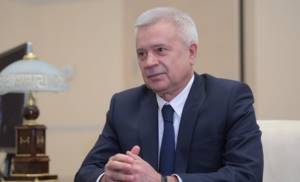
Vagit Alekperov
The main authority for Alekperov throughout his life was his mother, whom the son did not want to upset with his own behavior. Therefore, yard games with peers were unacceptable for the future oil worker, who from early childhood wanted to connect his fate with black gold. To achieve this, the young man graduated from the Azerbaijan Institute of Oil and Chemistry and, with a diploma in mining engineering, boldly set off on a long journey to pursue his dream.
Dossier:
- Full name: Vagit Yusufovich Alekperov
- Date of birth: September 1, 1950
- Education: Azerbaijan Institute of Oil and Chemistry, specialty “Mining Engineer”, has a Doctor of Economics degree
- Date of start of entrepreneurial activity/age: 1991, 41 years old
- Type of activity at the start: co-founder of the Langepas-Uray-Kogalym-neft concern
- Current activity: President, executive member of the Board of Directors, Chairman of the Management Board of PJSC LUKOIL
- Current net worth: $13.2 billion (Aug. 2021) according to forbes.com
Business
Before becoming a successful businessman, Vagit Alekperov had to go through a difficult and thorny path to success, starting from the bottom. While still a student, Vagit got a job as a driller in, which became the starting point in the professional biography of the oligarch. In the first years, the future entrepreneur had to work in extreme conditions: Vagit went to sea on unequipped oil platforms that were subject to fires and explosions. One day, a young worker was thrown into the open sea by a blast wave. Vagit was saved only thanks to his ability to swim well.
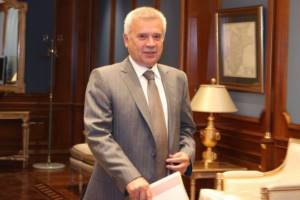
Vagit Alekperov
Within five years after graduating from the institute, Alekperov managed to rise from a simple oil and gas production operator to deputy shop manager, which became the first career achievement of the future oil tycoon. In the early 80s, Vagit Yusufovich, according to party orders, was sent to Western Siberia, where he worked as a manager in large oil companies and Fedorovskneft.
In the mid-80s, Vagit Alekperov was appointed to the position of general director of Kogalymneftegaz. In this post, he made a number of important acquaintances with oil workers from the Siberian branches, with one of whom, Yuri Shafranik, he later founded his life’s work.
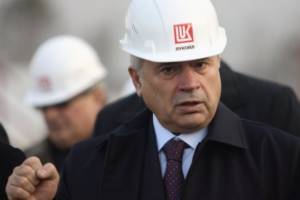
Head of NK Lukoil Vagit Alekperov
The enterprising head of the oil complex enjoyed authority among the party leadership, as well as among the workers. There are known cases when, during emergency situations that could lead to an explosion on an oil pipe, Alekperov was personally present at the site and helped in troubleshooting. In 1990, a young enterprising leader was invited to Moscow to take the post of Deputy Minister of the Oil Industry. Alekperov’s responsibilities included establishing connections with foreign colleagues. In his first year at the ministry, Vagit took part in a trip to Great Britain at the head of a delegation of Soviet oil workers, at the invitation of British Petroleum. Two years later, it appeared and quickly began to develop.
In 1995, oil tycoon Vagit Alekperov replenished his assets with shares of the largest Russian bank, Imperial, which collapsed in 1998 during the global crisis. The oligarch also has a large private network of gas stations, a private oil trader and a company producing motor additives.
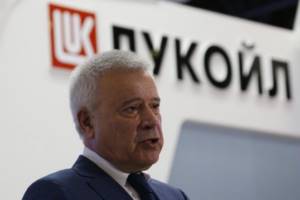
Vagit Alekperov, NK Lukoil
President of NK Lukoil Vagit Alekperov expanded the scope of the oil business in many countries of the world. The company has representative offices in Russia, Belarus, Azerbaijan, Ukraine, the USA and Bulgaria. For his successful work in the field of mining, the billionaire was repeatedly awarded honorary prizes and nominated for government awards. Brief information about Alekperov’s career is posted on the company’s official website.
In 2007, the oilman created the Our Future charity foundation, which is dedicated to the development of social entrepreneurship in Russia. The oil tycoon bequeathed his own shares of Lukoil to this fund, which will allow the organization to exist even after the death of Vagit Yusufovich. Since 2010, Alekperov has also been a member of the Skolkovo Foundation Board.
How Vagit Alekperov rose
A new special project is starting on the Tsargrad TV channel, dedicated to how large fortunes were earned in Russia. The owner of one of the largest oil companies, Vagit Alekperov, became known for being the first in the country to use the notorious share-for-shares auctions
How was the largest private oil company created? How did all these countless assets end up in the hands of Alekperov and his team? Why do the members of this team enjoy truly royal immunity?
Vagit Yusufovich Alekperov looks, perhaps, the happiest and most sinless among the managers and shareholders of private oil and gas companies in Russia. He did not have to develop projects in a competitive environment, did not have to fight for a place under the cold oil and gas sun in the harsh market reality - he received his company on a silver platter that one can only be amazed.
Fast road to Kogalym
The portrait of fatherlessness (Alekperov’s father died in the cold 1953, when the boy was three years old), which the oligarch’s biographers like to demonstrate, becomes somehow unconvincing if you look at subsequent events. Vagit, apparently, did not serve in the army. The chronology of his official biography (working experience from 22 years old, graduated from the most prestigious institute of the republic at 24 years old) leaves a couple of years for repaying his debt to the Motherland, but that small part of our elite who actually served usually does not miss the opportunity to boast about this circumstance, from Alekperov No one heard the soldiers' tales. Digression: in general, Vagit Yusufovich has great respect for the military; they say that about a third of LUKoil managers are former career military men. All other things being equal, they will always hire a former officer or at least one who served - such people are less inclined to reason. Because only one person has the right to reason in the current LUKoil.
The miracles that occurred in Baku after Alekperov graduated from the Institute, from 1974 to 1979, have not yet been deciphered by science. An ordinary oil and gas production operator changed several positions in less than six years and, in less than 30 years, became the deputy head of the local oil field. There are almost no such careers even now, and even more so in Soviet times.
Photo: www.globallookpress.com
But these were just positions, salary and respect. And Vagit Yusufovich’s path to fame began to accelerate in 1979, when he, a young communist and an unusually talented specialist, was sent from warm Baku to develop the Western Siberian deposits. He ended up at Surgutneftegaz, where he also advanced extremely quickly. In 1983, Alekperov moved to Kogalym, where he became the head of the local oil and gas production department, that is, the de facto owner of the single-industry town. Since 1987, he has been the general director of the Kogalymneft production association.
Boring? Oh no, in those years it was not boring there at all. It was in Kogalym that Alekperov made acquaintances that would later allow him to take off on the crest of an oil wave. Here we should name Alexander Putilov, who headed Urayneftegaz, Yuri Shafranik, the king of Langepasneftegaz, as well as the enterprising Gennady Bogomolov, who will be discussed below.
No Union - no property
In January 1990, the career of the still fairly young manager entered a new stage - he became the youngest Deputy Minister of the USSR and the youngest official in such a position in the history of the Ministry of Oil and Gas Industry. A year later - first deputy minister. And, unlike other allied departments, powerless in the face of the newly formed Russian and republican parallel structures, the oil workers of the USSR held their power tightly. It was the progressive-minded Deputy Minister Alekperov, who spied the idea of vertically integrated oil companies from the Italians, and proposed to implement it in Russia. VINK is a vertically integrated oil company, that is, engaged in the entire cycle - from geological exploration to retail sales of gasoline. Gazprom had already been created, and on the eve of advancing capitalism, the state should have taken care of oil assets. State, the future Rosneft, was created in 1991, but, unlike Gazprom, it failed to retain the country's main assets. And the main reason for this was the energetic work of Vagit Alekperov.
V. Alekperov. Photo: www.globallookpress.com
A month before the legal demise of the Soviet Union, its Council of Ministers sang its swan song - it turned out to be Resolution No. 18 of November 25, 1991, according to which the richest oil producing and refining enterprises were united into vertically integrated oil companies under the sweet name “LangepasUrayKogalym-Oil”. Later, the first three letters of the key mining assets formed the famous ONION, any attempt to clean which invariably caused both competitors and journalists to cry.
Even then, Alekperov, under the patronage of his Union Minister Leonid Filimonov, actually controlled the enterprise. And although Vagit Yusufovich’s bureaucratic career ended with the collapse of the USSR, his influence did not weaken, on the contrary.
At the end of 1992, President Boris Yeltsin signed the famous decree No. 1403 “On the peculiarities of privatization and transformation into joint-stock companies of state-owned enterprises, production and scientific-production associations of the oil, oil refining industry and petroleum products supply” - the fate of the state share in the “oil industry” was a foregone conclusion (with gas It didn’t work out that way - Viktor Chernomyrdin saved the industry from complete privatization). And at the beginning of 1993, the solitaire finally took shape - Yuri Shafranik, a longtime ally of Alekperov, became the head of the Ministry of Fuel and Energy. And the black oil sun rose over the LUKoil empire.
But the asset had to be somehow taken away from state hands - Alekperov did not want to work as a hired manager in his fifth decade; he had already done this in Baku, Tyumen villages and Kogalym.
Privatization and loans-for-shares auction
The privatization of LUKoil began in earnest in 1994. In 1995, by government decree, LUKoil received controlling stakes in nine large enterprises operating at all levels of the production chain. At the same time, shares of the new giant were placed through companies with good Russian names Paribas, CS First Boston and the like. Partially, Alekperov and his team paid the government with American promissory notes, and in 1996, The Bank of New York announced that it was becoming a “trustee” of LUKoil in the process of placing convertible bonds.
Photo: www.globallookpress.com
So it was LUKoil that became the pioneer of the notorious loans-for-shares auctions. “Our company is able to give the Russian government a certain amount on the security of its shares. At the same time, the government can, at a convenient time, repurchase these shares from LUKoil. We are not interested in the government completely abandoning its stake,” LUKavil, then the future main shareholder of the company. Then another 5% of the state’s oil shagreen leather passed into private hands (apparently affiliated with LUKoil management) for $35 million, less than a dollar per share.
For comparison, at the first stage of privatization the share cost $6.1. But foreign companies were not allowed to participate in the second one. For comparison, 5% of the company is now worth $3.3 billion - almost 100 times more expensive. And one should not think that during this time LUKoil grew a hundred times - there was simply a colossal undervaluation, a colossal underpayment to the state, for which, in fact, the loans-for-shares auctions were started. But Boris Yeltsin, who approved them, received unlimited support in the 1996 elections.
State interests were not taken into account in the privatization process. Or rather, the state interests of other countries were taken into account, but not of Russia,
— said then the head of the Accounts Chamber, Veniamin Sokolov.
Couldn't have said it better. The American Atlantic Richfield Company (ARCO) then became LUKoil’s strategic partner, and to a large extent the business of the largest player in the Russian oil market was controlled from overseas. Well, Alekperov himself speaks unequivocally about his attitude towards his homeland, be it Azerbaijan or Russia: “I am a patriot of hydrocarbons.”
Were these schemes corrupt? No, because there is no court decision condemning even the extreme forms of privatization of the 1990s. Were they honest and moral from a layman's point of view? No, either, since they represented the embodiment of the principle “take every nail from work” on a truly cosmic scale.
Everyone lived like this
The life of the independent LUKoil in the nineties proceeded according to the laws of these very nineties. Thus, numerous black PR sites repeat the fiction that Vladimir Gusinsky’s “Most” group spread in 1998 - that the then head of government Viktor Chernomyrdin allegedly shelved a note from the head of the Ministry of Internal Affairs Anatoly Kulikov about the numerous connections of LUKoil with the criminal world. Anatoly Sergeevich decisively denied to Constantinople the existence of such a note.
A. Kulikov. Photo: gov-news.ru
It is more difficult with another accusation - close contacts with Gennady Bogomolov, whom the media of that time called a thief in law, nicknamed Bogomol. This man really headed LUKoil-Market and actively defended his reputation from media suspicion. Nevertheless, he is confidently called “the three-time convicted secret co-owner of LUKoil.” They wrote about disagreements between friends back in 2001, but they separated later.
How things were conducted around LUKoil can be clearly seen from the investigation into the kidnapping of LUKoil Vice President Sergei Kukura - this long detective story is characterized by the fact that the kidnapped manager got away unscathed, but the organizer of his kidnapping was shot dead. There, by the way, Bogomolov also plays an important role, who chose to negotiate with the kidnappers without contacting the police.
Now Gennady Semyonovich is the president of the board of directors of Agrico LLC. “No offshore companies, gray schemes or fictitious entrepreneurship,” colleagues cheerfully write about the company, 100% owned by the Dutch Martinico Beheer I B.V. By the way, these people love to read touching materials about themselves. So the remnant of the once mighty “Russian Planet” published an incredibly enthusiastic eulogy for Alekperov. The author is even confused at what age young Vagit supplied his large family with fish - first it was at five or six years old, and then at four years old. And then - an impeccable biography of the great monogamous man, a worker from God, the creator of a magnificent company.
Let's return from panegyrics to reality. It is especially gratifying that all these complex manipulations with the removal of LUKoil from the control of the Russian Federation were carried out, it seems... by a citizen of independent Estonia. In 2002, it became known that the Estonian government intended to take away the passport of the Azerbaijani-Russian tycoon, since he had obtained it, possibly using forged documents. They write that Alekperov became an Estonian because his mother, who is described in all biographies as the Cossack Tatyana Bocharova, once had Estonian citizenship. And at some point the authorities of the Baltic country doubted this. The further fate of Alekperov’s European passport is unknown.
New time - new entertainment
Photo: www.globallookpress.com
Unfortunately, ownership automatically comes with the obligation to pay taxes. It was interpreted very freely at LUKoil. Thus, in April 2002, the Accounts Chamber revealed violations in the payment of excise taxes for 2000 and 2001 by Nizhny Novgorod-Nefteorgsintez and LUKoil-Permnefteorgsintez, which were part of the LUKoil system. It was about billions, but the Ministry of Taxes and Duties was not interested in these documents. In 2003, the Nizhny Novgorod region complained about a shortfall of two billion rubles from excise taxes and inflated gasoline prices by the monopolist. To no avail.
Although, of course, life changed in the 2000s. Detective showdowns have been replaced by social responsibility. Thus, the owners of large blocks of LUKoil took on an important mission - the development of FC Spartak (Moscow), perhaps the most popular sports club in Russia. In 2004, LUKoil vice-president Leonid Fedun was believed to have acquired the team, and... in general, it was difficult to call it development; Spartak, spoiled by victories, fell into an unprecedented trophy drought. Only in 2021 it became clear that although Fedun has always been the face of Spartak, Alekperov’s share is actually larger. For some reason, colossal chains of ownership have been created there with a significant offshore part (no one should know who owns the “narkomanda”), which is crowned by Sport-Holding LLC and Capital Assets JSC, which control the legendary football club.
L. Fedun. Photo: www.globallookpress.com
12 years before LUKoil, Spartak was the champion of Russia nine times, in 15 years with LUKoil - once. But people are busy doing what they love.
Do you refuel at LUKoil?
The dirty story that happened in 2010 added some color to the bright image of LUKoil. At the end of February, LUKoil vice-president Anatoly Barkov, who was in an extremely hurry to attend to his Alekperov affairs, got into an accident in his S-Class Mercedes on Leninsky Prospekt - he collided with an oncoming Citroën C3. The Citroen driver died on the spot, her passenger, Doctor of Medical Sciences Vera Sidelnikova, died in intensive care. Mr. Barkov received minor injuries. A criminal case was not opened for a long time, the video footage disappeared, and the woman from Citroen was found guilty. As we can see, LUKoil has enormous opportunities to influence the investigation. After all, even when a video leaked online showing Barkov’s Mercedes openly driving along the median and heading towards oncoming traffic, when President Dmitry Medvedev personally instructed to objectively understand the story, nothing was done. The case was closed only in 2013, the deceased remained guilty, and the Mercedes driver’s license was not even taken away.
Video of Barkov's accident from surveillance cameras
It’s interesting that the slogan “I don’t fill up at Lukoil” appeared a year and a half earlier than this sad event. It was invented back in the summer of 2008 by Spartak fans from the Fratria group, who were just outraged by the five-year plan without trophies (if only the poor fellows knew how much longer they had to endure). And after the events of February 25, 2010, this slogan was taken over by ordinary motorists.
A normal human decision on the part of Mr. Alekperov would be to publicly admit the guilt of the driver Barkov, his resignation and payment of compensation to the victims. He didn't do any of this. Barkov retired with honor after three and a half years. And the tradition of Lukoil racing was adopted by the son of another vice-president, Azat Shamsuarov.
* * *
An unprecedented career rise using fuel unknown to science. Privatization of a state-entrusted enterprise with the help of Americans for ridiculous money. Extremely dubious partners. Easy attitude towards taxes. All this with an Estonian passport in your pocket. This is how LUKoil rose.
V. Alekperov. Photo: www.globallookpress.com
In general, there are an incredible number of large and small scandals - from the tax hole in 1997 to attempts to buy up the lands of Massandra in 2016; the volume of the RuNet is not enough to list everything in detail. But the result is impressive: Vagit Alekperov’s fortune is estimated at more than $20 billion, he is the fourth richest man in Russia (Forbes, 2019) and has unofficial immunity from any persecution.
All this would be absolutely impossible if the institution of reputation operated in our government and business community. We are very kind people and easily forgive small sins of our good friends. Moreover, a full member of the Russian Academy of Natural Sciences (why are these guys all trying to be considered great scientists?) is actively involved in charity work and even intends to bequeath his considerable share of LUKoil not to children, but to a charitable foundation.
How can you not respect such a person?
Personal life
Vagit Alekperov’s personal life turned out well, as did his business career. The oilman married Larisa Viktorovna at the beginning of his professional career, who has been the oligarch’s constant and devoted life partner for 40 years. In 1990, the oil tycoon and his wife had their only son, whom Vagit named after his father, Yusuf.
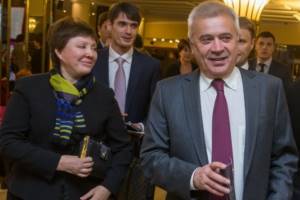
Vagit Alekperov with his wife
The boy followed in his father’s footsteps and is trying to realize himself in the oil sector, having received an appropriate education at the Russian State University of Oil and Gas. Yusuf received his second higher education degree in Economics and Management. The young man is interested in collecting expensive cars, photos of which end up on the young man’s pages on social networks.
Billionaire Vagit Alekperov devotes his free time from the oil business to his family. The couple and their son love to travel around the world, but their favorite place for leisure is Crimea. Also among the oligarch’s hobbies, tennis and tennis are a priority.
Condition of Vagit Alekperov
At the moment, he owns 24.5% of the shares of NK (according to Forbes magazine).
Alekperov earned billions of dollars from oil. Table 1. State of Vagit Alekperov in 2010-2017.
| Year | Position in the world ranking | Position in the Russian ranking | Wealth, billion dollars |
| 2010 | 28 | 7 | 1,6 |
| 2011 | 20 | 8 | 13,9 |
| 2012 | 26 | 5 | 13,5 |
| 2013 | 55 | 5 | 14,8 |
| 2014 | 76 | 7 | 13,6 |
| 2015 | 96 | 6 | 12,2 |
| 2016 | 124 | 9 | 8,9 |
| 2017 | 74 | 6 | 14,5 |
Forbes Magazine
Vagit Yusufovich has been considered one of the richest people in Russia for many years. In 2021, Forbes estimated his fortune at $16.4 billion (an increase over the year - $1.9 billion). According to this indicator, he is in 4th place among all businessmen in the country.
Vagit Alekperov is not only a talented and professional person, but also knows how to think ahead. He knows how to adapt to a new environment and show loyalty in time and place.
Quote. “It is impossible to separate the interests of the company from the interests of the state on whose territory it operates.”
It was thanks to his strategic thinking that the entrepreneur “made himself” and was able to develop and achieve his current status.
Condition assessment
Vagit Alekperov’s fortune in 2021 was estimated by Russian Forbes at $8.9 billion. This allowed the head of Lukoil to take 9th place in the ranking of the richest businessmen in Russia. Over the year, the amount increased to $14.5 billion, which raised the oligarch’s rating to sixth position in Russia and 74th place in the world ranking.
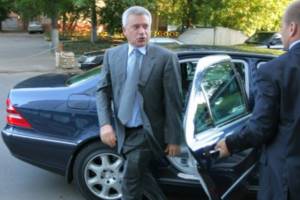
One of the richest people in Russia Vagit Alekperov
In addition to his billion-dollar fortune, the oil tycoon’s assets include the Numismatics Museum, which Alekperov opened in Moscow in 2015. The exhibition includes 700 ancient coins, the most expensive of which was purchased in 2013 for $410 million.
Vagit Yusufovich Alekperov. Curriculum Vitae
From 1972 to 1979, Vagit Alekperov worked in the Oil and Gas Production Department. A.P. Serebrovsky Production Association "Kaspmorneft" (NGDU named after A.P. Serebrovsky PA "Kaspmorneft"): driller (1972‑1974), oil and gas production operator, process engineer (1974‑1977), shift supervisor (1977-1978), foreman (1978), senior engineer - deputy head of the oil field (1978-1979).
From October 1979 to 1985, Alekperov worked in Siberia at the Surgutneftegaz Production Association (PO). In 1979-1980, he worked as a senior engineer, head of oil field No. 2 of the NGDU Fedorovskneft of the Surgutneftegaz Production Association (Surgut, Tyumen Region).
In 1980-1981, he was the head of the Central Engineering and Technological Service of NGDU Kholmogorneft of Surgutneftegaz Production Association (Noyabrsk village, Purovsky district, Tyumen region).
From 1981 to 1983, he held the position of chief engineer - deputy head of NGDU Lyantorneft of Surgutneftegaz Production Association (Lyantor village, Surgut district, Tyumen region).
In 1983-1985, Alekperov worked as the head of the NGDU Povkhneft of the Surgutneftegaz Production Association (Kogalym village, Surgut district, Tyumen region).
From 1985 to 1987, he was First Deputy General Director for Western Siberia of the Bashneft Production Association (Kogalym village, Surgut district, Tyumen region, RSFSR).
In 1984-1990, he was General Director of the Kogalymneftegaz Production Association.
From January 1990 to 1991, Vagit Alekperov served as Deputy Minister of the Oil and Gas Industry of the USSR.
In 1991, he was appointed First Deputy Minister of the Oil and Gas Industry of the USSR.
Since 1991, Alekperov has been vice president of the International Oil Consortium (IOC). Deputy Chairman of the Union of Oil Exporters of Russia.
At the end of 1991, Alekperov initiated the creation of the Langepas-Uray-Kogalym-Neft Oil Concern (later OJSC LUKoil), registered on November 25, 1991 as a structural division of the Ministry of Fuel and Energy.
From 1992 to 1993, Alekperov headed the Langepas-Uray-Kogalym-Oil Oil Concern.
On April 5, 1993, the state concern Langepas-Uray-Kogalym-Oil was transformed into the joint-stock company Neftyanaya, of which Alekperov became president.
From 1993 to January 2000, Alekperov was Chairman of the Board of Directors of OAO LUKoil.
In 1995 - 1998, Alekperov was chairman of the supervisory board, member of the board of trustees, and chairman of the board of trustees of Imperial Bank.
In 1995 - 2000 - Chairman of the Board of Directors of Petrocommerce Bank.
From 1996 to 2002, he was a member of the board of directors of CJSC Volzhsko-Kama Oil LUKOIL.
From 2001 to 2006, he was Chairman of the Board of Directors of OJSC RITEK.
Since 2000 - Chairman of the Supervisory Board of LUKOIL International GmbH.
Since 2005 - member of the government commission on issues of the fuel and energy complex and reproduction of the mineral resource base.
In April 1996, during the campaign for the presidential elections in the Russian Federation, Alekperov was a confidant of Russian President Boris Yeltsin in the Tyumen region.
In 2000, Alekperov joined the board of the Russian Union of Industrialists and Entrepreneurs (RSPP). Subsequently, he was re-elected to the board twice - in 2003 and 2006. In June 2006, Alekperov headed the committee on energy security, energy efficiency and development of fuel and energy sectors created at the RSPP.
Alekperov is a Doctor of Economics, a full member of the Russian Academy of Natural Sciences, the author of a number of books and scientific publications, including the monographs “Vertically Integrated Oil Companies of Russia: Methodology of Formation and Implementation” (1996) and “Russian Oil: A Top Manager’s View” (2001 ).
Vagit Alekperov is a two-time laureate of the Government of the Russian Federation, awarded four orders and eight medals, including the Order of the Badge of Honor (1986), the Order of Friendship (1996), the Order of Glory (for services in the development of economic relations between Azerbaijan and the Russian Federation), the medal " For the development of subsoil resources and the development of the oil and gas complex in Western Siberia", Order of Merit for the Fatherland, IV degree (2005).
According to the Forbes magazine rating, published in March 2007, Vagit Alekperov's fortune in 2007 reached $14.3 billion.
According to the Forbes magazine ranking published in March 2009, by 2009 Vagit Alekperov became one of three Russians included in the hundred richest people in the world. Alekperov's fortune, according to the magazine, reached $7.8 billion. In the world ranking of the richest people in the world in 2009, he ranks 57th.
Alekperov is married, in 1990 his son Yusuf was born.
The material was prepared based on information from RIA Novosti and open sources
Vagit Alekperov now
In 2021, controlled by Vagit Alekperov, acquired the lands of Crimean vineyards, the territory of which totals 36 hectares. The public expressed concerns about misuse of the vineyards by the new owners in the future. It is expected that construction will begin at the new location.
Now Vagit Alekperov continues to develop the geography of deposits. In November 2021, the head of the oil corporation visited Udmurtia, where geological exploration is already underway in three areas, while nine more projects have been launched.
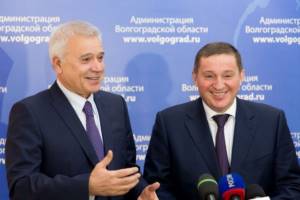
Vagit Alekperov and Andrey Bocharov
At the end of November, Alekperov arrived in the Volgograd region, where he signed an agreement on socio-economic cooperation with Governor Andrei Bocharov.
In mid-December, the General Prosecutor's Office began checking the documentation of Otkritie Bank, the main shareholder of which, in addition to Leonid Fedun, Vadim Belyaev, Alexander Mamut, is Vagit Alekperov. In 2021, the bank acquired a diamond mining company, which belonged to Alekperov, at an inflated price. The deal became fatal for the credit corporation; funds from the Central Bank were required to rehabilitate the bank. Prosecutors suspect that the difference was divided between the three main shareholders. Participants in the transaction face penalties in favor of the struggling bank.










